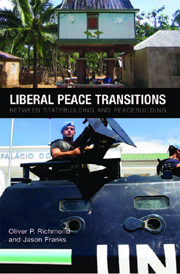Book contents
- Frontmatter
- Contents
- Acknowledgements
- List of Acronyms
- Introduction: a Framework to Assess Liberal Peace Transitions
- 1 Cambodia: Liberal Hubris and Virtual Peace
- 2 Bosnia: Between Partition and Pluralism
- 3 Liberal Peace in East Timor: the Emperors' New Clothes?
- 4 Co-opting the Liberal Peace: Untying the Gordian Knot in Kosovo
- 5 Building/Rejecting the Liberal Peace: State Consolidation and Liberal Failure in the Middle East
- Conclusion: Evaluating the Achievements of the Liberal Peace and Revitalising a Virtual Peace
- Select Bibliography
- Index
Introduction: a Framework to Assess Liberal Peace Transitions
Published online by Cambridge University Press: 12 September 2012
- Frontmatter
- Contents
- Acknowledgements
- List of Acronyms
- Introduction: a Framework to Assess Liberal Peace Transitions
- 1 Cambodia: Liberal Hubris and Virtual Peace
- 2 Bosnia: Between Partition and Pluralism
- 3 Liberal Peace in East Timor: the Emperors' New Clothes?
- 4 Co-opting the Liberal Peace: Untying the Gordian Knot in Kosovo
- 5 Building/Rejecting the Liberal Peace: State Consolidation and Liberal Failure in the Middle East
- Conclusion: Evaluating the Achievements of the Liberal Peace and Revitalising a Virtual Peace
- Select Bibliography
- Index
Summary
Introduction
Since the early 1990s, the projects of peacebuilding and statebuilding have increasingly been integrated. Since the early 2000s, this has been mainly an outcome of the United States and the United Kingdom's support for an active, muscular and humanitarian liberal internationalism. This has thrown up similar internal anomalies and inconsistencies that can also be observed in liberal forms of imperialism, as Hobson so accurately characterised at the start of the twentieth century. As such issues have emerged, criticism has become more pronounced from a range of commentators, both local and international, policy and academic. This study examines the discourses of peace implicit in the theoretical and policy literatures relating to these debates, and investigates their impact in the context of a number of specific case studies chosen to represent the range and diversity of liberal peacebuilding. To date, there has been little research that has specifically focused on peace, as opposed to war or order. As a result, systematic inquiries into peace are rare and unsurprisingly there is an inadequate understanding of the contemporary conceptualisation of peace, nor its empirical dynamics. Both academics and policymakers, however, often see the advantage of a clearer understanding of the concept of peace as an alternative, a liberal assumption or an ideal type, both in theory and in empirical terms.
This study explicitly examines the nature of the peace created through different aspects of, and the praxis of, contemporary peacebuilding. It examines the development of the discourse of the liberal peace and compares this evolution with the development of practical approaches for peace, in the context of peacebuilding, the work of international organisations, donors, agencies, non-governmental organisations (NGOs) and the contributions of key liberal states.
- Type
- Chapter
- Information
- Liberal Peace TransitionsBetween Statebuilding and Peacebuilding, pp. 1 - 17Publisher: Edinburgh University PressPrint publication year: 2009

